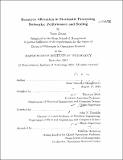Resource allocation in stochastic processing networks : performance and scaling
Author(s)
Zhong, Yuan, M. Eng. Massachusetts Institute of Technology
DownloadFull printable version (8.294Mb)
Other Contributors
Massachusetts Institute of Technology. Operations Research Center.
Advisor
Devavrat Shah and John N. Tsitsiklis.
Terms of use
Metadata
Show full item recordAbstract
This thesis addresses the design and analysis of resource allocation policies in largescale stochastic systems, motivated by examples such as the Internet, cloud facilities, wireless networks, etc. A canonical framework for modeling many such systems is provided by "stochastic processing networks" (SPN) (Harrison [28, 29]). In this context, the key operational challenge is efficient and timely resource allocation. We consider two important classes of SPNs: switched networks and bandwidth-sharing networks. Switched networks are constrained queueing models that have been used successfully to describe the detailed packet-level dynamics in systems such as input-queued switches and wireless networks. Bandwidth-sharing networks have primarily been used to capture the long-term behavior of the flow-level dynamics in the Internet. In this thesis, we develop novel methods to analyze the performance of existing resource allocation policies, and we design new policies that achieve provably good performance. First, we study performance properties of so-called Maximum-Weight-[alpha] (MW-[alpha]) policies in switched networks, and of a-fair policies in bandwidth-sharing networks, both of which are well-known families of resource allocation policies, parametrized by a positive parameter [alpha] > 0. We study both their transient properties as well as their steady-state behavior. In switched networks, under a MW-a policy with a 2 1, we obtain bounds on the maximum queue size over a given time horizon, by means of a maximal inequality derived from the standard Lyapunov drift condition. As a corollary, we establish the full state space collapse property when [alpha] > 1. In the steady-state regime, for any [alpha] >/= 0, we obtain explicit exponential tail bounds on the queue sizes, by relying on a norm-like Lyapunov function, different from the standard Lyapunov function used in the literature. Methods and results are largely parallel for bandwidth-sharing networks. Under an a-fair policy with [alpha] >/= 1, we obtain bounds on the maximum number of flows in the network over a given time horizon, and hence establish the full state space collapse property when [alpha] >/= 1. In the steady-state regime, using again a norm-like Lyapunov function, we obtain explicit exponential tail bounds on the number of flows, for any a > 0. As a corollary, we establish the validity of the diffusion approximation developed by Kang et al. [32], in steady state, for the case [alpha] = 1. Second, we consider the design of resource allocation policies in switched networks. At a high level, the central performance questions of interest are: what is the optimal scaling behavior of policies in large-scale systems, and how can we achieve it? More specifically, in the context of general switched networks, we provide a new class of online policies, inspired by the classical insensitivity theory for product-form queueing networks, which admits explicit performance bounds. These policies achieve optimal queue-size scaling, in the conventional heavy-traffic regime, for a class of switched networks, thus settling a conjecture (documented in [51]) on queue-size scaling in input-queued switches. In the particular context of input-queued switches, we consider the scaling behavior of queue sizes, as a function of the port number n and the load factor [rho]. In particular, we consider the special case of uniform arrival rates, and we focus on the regime where [rho] = 1 - 1/f(n), with f(n) >/= n. We provide a new class of policies under which the long-run average total queue size scales as O(n1.5 -f(n) log f(n)). As a corollary, when f(n) = n, the long-run average total queue size scales as O(n2.5 log n). This is a substantial improvement upon prior works [44], [52], [48], [39], where the same quantity scales as O(n3 ) (ignoring logarithmic dependence on n).
Description
Thesis (Ph. D.)--Massachusetts Institute of Technology, Sloan School of Management, Operations Research Center, 2012. Cataloged from PDF version of thesis. Includes bibliographical references (p. 189-193).
Date issued
2012Department
Massachusetts Institute of Technology. Operations Research Center; Sloan School of ManagementPublisher
Massachusetts Institute of Technology
Keywords
Operations Research Center.